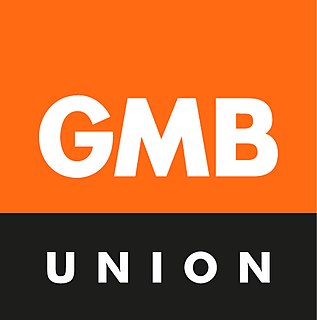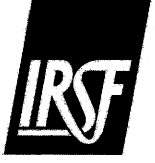Related Research Articles

The GMB is a general trade union in the United Kingdom which has more than 600,000 members. Its members work in nearly all industrial sectors, in retail, security, schools, distribution, the utilities, social care, the National Health Service (NHS), ambulance service and local government.

The Transport and General Workers' Union was one of the largest general trade unions in the United Kingdom and Ireland – where it was known as the Amalgamated Transport and General Workers' Union (ATGWU) to differentiate itself from the Irish Transport and General Workers' Union – with 900,000 members. It was founded in 1922 and Ernest Bevin served as its first general secretary.

The Ceramic and Allied Trades Union (CATU) was a trade union representing pottery workers in the United Kingdom.
The Workers' Union was a general union based in the United Kingdom, but with some branches in other countries. During the 1910s, it was the largest general union in the UK, but it entered a rapid decline in the 1920s, and eventually became part of the Transport and General Workers' Union (TGWU).
Labour unions emerged in Japan in the second half of the Meiji period, after 1890, as the country underwent a period of rapid industrialization. Until 1945, however, the labour movement remained weak, impeded by a lack of legal rights, anti-union legislation, management-organized factory councils, and political divisions between “cooperative” and radical unionists.

The Modern Records Centre (MRC) is the specialist archive service of the University of Warwick in Coventry, England, located adjacent to the Central Campus Library. It was established in October 1973 and holds the world's largest archive collection on British industrial relations, as well as archives relating to many other aspects of British social, political and economic history.
The Chemical Workers' Union was a trade union in the United Kingdom.

The Inland Revenue Staff Federation (IRSF) was a trade union in the United Kingdom.

The Confederation of Shipbuilding and Engineering Unions (CSEU), often known as the Confed is a trade union confederation in the United Kingdom.
The Queen's Birthday Honours 1952 were appointments in many of the Commonwealth realms of Queen Elizabeth II to various orders and honours to reward and highlight good works by citizens of those countries. The appointments were made to celebrate the official birthday of The Queen, and were published in supplements of the London Gazette on 30 May 1952 for the United Kingdom and Colonies, Australia, New Zealand, Ceylon, and Pakistan.
The Queen's Birthday Honours 1954 were appointments in many of the Commonwealth realms of Queen Elizabeth II to various orders and honours to reward and highlight good works by citizens of those countries. The appointments were made to celebrate the official birthday of The Queen.
The Amalgamated Society of Engineers (ASE) was a major British trade union, representing factory workers and mechanics.
The King's Birthday Honours 1951 were appointments in many of the Commonwealth realms of King George VI to various orders and honours to reward and highlight good works by citizens of those countries. The appointments were made to celebrate the official birthday of the King, and were published on 1 June 1951 for the British Empire, Australia, New Zealand, Ceylon, and Pakistan. These were the last Birthday Honours awarded by George VI, who died eight months later.
The 1951 New Years Honours were appointments in many of the Commonwealth realms of King George VI to various orders and honours to reward and highlight good works by citizens of those countries. They were announced on 1 January 1951 for the British Empire, Australia, New Zealand, Ceylon, and Pakistan.
The 1949 New Year Honours were appointments by many of the Commonwealth realms of King George VI to various orders and honours to reward and highlight good works by citizens of those countries. They were announced in supplements to the London Gazette of 31 December 1948 for the British Empire, New Zealand, India, and Ceylon to celebrate the past year and mark the beginning of 1949.
The 1948 New Year Honours were appointments by many of the Commonwealth realms of King George VI to various orders and honours to reward and highlight good works by citizens of those countries. They were announced on 1 January 1948 for the British Empire and New Zealand to celebrate the past year and mark the beginning of 1948. By coincidence it coincided with the nationalization of the Big Four railways into what is now known as British Railways.
The 1947 King's Birthday Honours were appointments by many of the Commonwealth Realms of King George VI to various orders and honours to reward and highlight good works by citizens of those countries. The appointments were made "on the occasion of the Celebration of His Majesty's Birthday." They were announced in supplements to the London Gazette of 6 June 1947.
The 1947 New Year Honours were appointments by many of the Commonwealth Realms of King George VI to various orders and honours to reward and highlight good works by citizens of those countries. They were published on 31 December 1946.
The General Council of the Trades Union Congress is an elected body which is responsible for carrying out the policies agreed at the annual British Trade Union Congresses (TUC).
The Civil Service Alliance was a trade union federation bringing together civil servants in the United Kingdom.
References
- 1 2 3 4 5 6 Marsh, Arthur; Ryan, Victoria (1980). Historical Directory of Trade Unions. Vol. 1. Farnborough: Gower. p. 128. ISBN 0566021609.